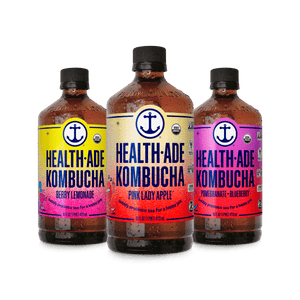
Kombucha | 12 Pack
Fan Favorite Variety Pack
One-time Purchase
49.95

Copied URL to clipboard!
Unfortunately, even though these unnatural substitutes are less harmful to blood sugar levels, several studies have linked these to harmful health outcomes like cancer, indigestion, and overall decline of the gut microbiome. It’s no wonder the search has been ON for a natural, unharmful, non-nutritive sweetener!
Although Stevia held some promise in this category, recent evidence is demonstrating it’s definitely NOT all good, especially when it comes to your gut.
What is stevia?
Stevia is derived from the leaves of the Stevia rebaudiana (Bertoni) plant—an herbal shrub from South America that has been used for centuries as a hypoglycemic agent. It has a very sweet taste, but your body can’t metabolize it, making it calorie-free. According to Mintel, Stevia is added to 14,500 foods and beverages sold on the US grocery shelf. Many of the products that contain stevia are positioning themselves as gut-healthy, like some other kombuchas and certain digestive-supporting soda alternatives.
Could Stevia be bad for your gut?
While more studies are needed to confirm this effect in vivo (AKA human trials), at least 4 animal studies and 1 human in vitro study demonstrate that stevia is in fact harmful to the microbiome. Here are the summaries:
All of these studies suggest that Stevia disrupts the microbiome, and therefore may be unhealthy for the gut.
The harm may not stop there
In addition to potential gut imbalance, other adverse effects from Stevia have been recorded and demonstrated across 372 studies, including:
Recommendation from researchers: avoid Stevia or use it sparingly
In general, Stevia is relatively new, and there are still a lot of gaps in the evidence base. There is still more research needed to investigate if the sugar-free benefits of Stevia outweigh the risks. In the meantime, it is advised by ALL the study researchers linked above to use these sweeteners “sparingly” until we know more.
One nutritionist’s take (That’s me!):
I, for one, am a fan of being mindful of sugar intake, but not having that be the only factor that influences the decision of food choice.
When creating Health-Ade, we wanted GUT HEALTH to be our true north. So, we stuck to a traditional 2,000 year old recipe as our guide for kombucha—using organic cane sugar and organic cold pressed juice to ferment and sweeten the beverage—and chose a Stevia-free recipe for our prebiotic soda, SunSip, which is sweetened with fruit juice, cane sugar and monk fruit. I am very proud of these ingredient choices, as many competitors in both the kombucha world and prebiotic soda world claim gut health benefits but use Stevia or other questionable sweeteners as a substitute.
YES, our recipes use some organic cane sugar and juice for sweetness, as do most fermented foods. Interestingly, the studies done on foods that use sugar in the fermentation process show DRASTICALLY different outcomes than studies that consider what happens to the body when we ingest sugar alone. In fact, they show the opposite, including better digestion, healthier microbiomes, reduced inflammation and infection, as well as generally improved health outcomes. Perhaps there’s a place for a little bit of sugar—and it might just be in fermentation! Plus, trust me, you don’t want to drink your kombucha without a little bit of sweetness.
Anyway, if you ever hear me say “keep the sugar where it belongs,” now you know the background as to why.